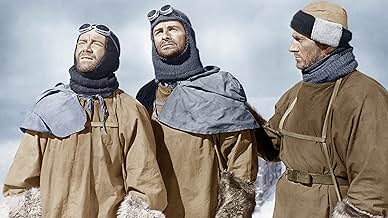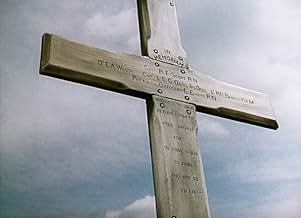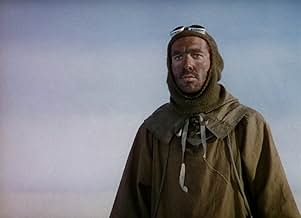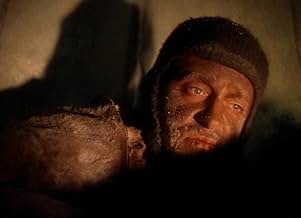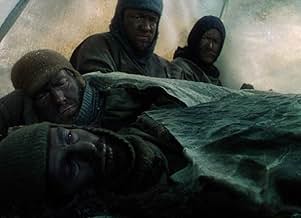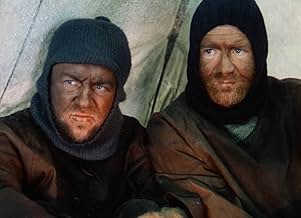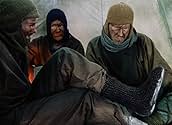IMDb-BEWERTUNG
7,0/10
2665
IHRE BEWERTUNG
Film um die Expedition des Entdeckers Robert Falcon Scott, der 1912 versucht, als Erster den Südpol zu erreichen.Film um die Expedition des Entdeckers Robert Falcon Scott, der 1912 versucht, als Erster den Südpol zu erreichen.Film um die Expedition des Entdeckers Robert Falcon Scott, der 1912 versucht, als Erster den Südpol zu erreichen.
- Regie
- Drehbuch
- Hauptbesetzung
- Nominiert für 1 BAFTA Award
- 1 Gewinn & 2 Nominierungen insgesamt
James McKechnie
- Surgeon Lt. E.L.Atkinson R.N.
- (as James Mc Kechnie)
Empfohlene Bewertungen
Although it verges on being a hagiography and cannot be considered to be historically accurate (what historical film is?), Scott of the Antarctic is a beautifully shot film with a great score and a solid cast. Some of the equipment from the actual expedition was used as props.
One of the other commentators on here makes mention of various failings of Scott's. Skis were depoted on the plateau due to poor surface conditions, as it was easier to haul without them and to carry them would have meant a considerable extra weight. Scott's own team depoted their skis, but went back for them when the conditions improved they did after all have an extra 200 miles to travel than Teddy Evan's team. Taff Evans wasn't abandoned on the Beardmore: he was suffering from possible brain damage and unable to pull the sledge. Considering that they all faced death if they didn't make the next depot in time, the other expedition members went on ahead with the intention of letting him catch up, whereupon he collapsed and died. Out of Teddy Evans's returning party only Evans himself came down with scurvy as he refused to eat either seal or pony meat for months. The other two members of his team, Crean and Lashly, didn't come down with scurvy and when the bodies of Scott and his men were discovered, the signs of scurvy were not visible on them either.
Nansen DID use dogs on his attempt at reaching the North Pole in 1893-95, although his earlier crossing of Greenland was done by manhaul. Scott already had decided to take skis on his expedition BEFORE he met Nansen in Norway, as he had gone there to buy the skis and test the motorised sledges. In fact it was he showed Nansen his locally purchased skis that the great man suggested Scott taking Gran with him. Gran DID teach Scott's men the basics of skiing on the pack ice on the way south. Scott himself was as good a skier as the average Norwegian. There is no evidence of an affair between Kathleen Scott and Nansen as on the occasion in question she was staying with American friends, not in the hotel with Nansen. According to the evidence they were good friends and nothing more.
One of the other commentators on here makes mention of various failings of Scott's. Skis were depoted on the plateau due to poor surface conditions, as it was easier to haul without them and to carry them would have meant a considerable extra weight. Scott's own team depoted their skis, but went back for them when the conditions improved they did after all have an extra 200 miles to travel than Teddy Evan's team. Taff Evans wasn't abandoned on the Beardmore: he was suffering from possible brain damage and unable to pull the sledge. Considering that they all faced death if they didn't make the next depot in time, the other expedition members went on ahead with the intention of letting him catch up, whereupon he collapsed and died. Out of Teddy Evans's returning party only Evans himself came down with scurvy as he refused to eat either seal or pony meat for months. The other two members of his team, Crean and Lashly, didn't come down with scurvy and when the bodies of Scott and his men were discovered, the signs of scurvy were not visible on them either.
Nansen DID use dogs on his attempt at reaching the North Pole in 1893-95, although his earlier crossing of Greenland was done by manhaul. Scott already had decided to take skis on his expedition BEFORE he met Nansen in Norway, as he had gone there to buy the skis and test the motorised sledges. In fact it was he showed Nansen his locally purchased skis that the great man suggested Scott taking Gran with him. Gran DID teach Scott's men the basics of skiing on the pack ice on the way south. Scott himself was as good a skier as the average Norwegian. There is no evidence of an affair between Kathleen Scott and Nansen as on the occasion in question she was staying with American friends, not in the hotel with Nansen. According to the evidence they were good friends and nothing more.
Produced by Ealing Studios, Scott of the Antarctic is a stiff upper- lipped depiction of Captain Scott's infamous, ill-fated expedition to the South Pole. Facing freezing storms, starvation, lack of fuel, and having just digested the sobering revelation that Norwegian rival Roald Amundsen had beaten them too it, Scott and his remaining team of four settled and died just 11 miles from camp, where food, warmth and undoubtedly survival awaited them. Trading very much on the legend of Captain Scott, the film charms thanks to it's post-WWII optimism and gorgeous colour cinematography.
Beginning with a determined Scott, played heartily by John Mills, rounding up his crew, the film takes it's time to get to the Arctic. Relying on Captain Scott's beautifully written diary for its source of information, the film feels more documentary than straight feature. It is all the more detailed and authentic for it, but it comes at the expense of any real character development. By the time the credits roll, we know little more about Scott than when we started, apart from that he was obviously a determined and courageous man. But it makes up for this neglect with a startling final third, where director Charles Frend puts us through every step of Scott's exhausting final thrust to get back to civilisation.
Mills and the supporting cast (James Robertson Justice, Kenneth More, Harold Warrender et al) are excellent throughout, starting out as eager and boisterous, and later, as the last survivors wait to die in the tent that would become their tomb, withdrawn and contemplative. The setting plays as the main villain, and it's captured as both a place of isolated beauty and uninhabitable terror , thanks to Jack Cardiff's stunning cinematography, and it's the encroaching sense of doom that gives Scott of the Antarctic a raw power. Although it obviously ends badly, Scott's death proved to be the making of him. Amundsen was (somewhat cruelly) dismissed as a bad sportsman, and Scott was instantly labelled a hero for daring to stare such overwhelming odds in the face and hold his head high. For a country still recovering from the ravishes of war at the time of the film's release, it must have been a powerful sentiment indeed. One of Ealing's most overlooked efforts.
www.the-wrath-of-blog.blogspot.com
Beginning with a determined Scott, played heartily by John Mills, rounding up his crew, the film takes it's time to get to the Arctic. Relying on Captain Scott's beautifully written diary for its source of information, the film feels more documentary than straight feature. It is all the more detailed and authentic for it, but it comes at the expense of any real character development. By the time the credits roll, we know little more about Scott than when we started, apart from that he was obviously a determined and courageous man. But it makes up for this neglect with a startling final third, where director Charles Frend puts us through every step of Scott's exhausting final thrust to get back to civilisation.
Mills and the supporting cast (James Robertson Justice, Kenneth More, Harold Warrender et al) are excellent throughout, starting out as eager and boisterous, and later, as the last survivors wait to die in the tent that would become their tomb, withdrawn and contemplative. The setting plays as the main villain, and it's captured as both a place of isolated beauty and uninhabitable terror , thanks to Jack Cardiff's stunning cinematography, and it's the encroaching sense of doom that gives Scott of the Antarctic a raw power. Although it obviously ends badly, Scott's death proved to be the making of him. Amundsen was (somewhat cruelly) dismissed as a bad sportsman, and Scott was instantly labelled a hero for daring to stare such overwhelming odds in the face and hold his head high. For a country still recovering from the ravishes of war at the time of the film's release, it must have been a powerful sentiment indeed. One of Ealing's most overlooked efforts.
www.the-wrath-of-blog.blogspot.com
The first thing to remember is that Scott fouled up mightily in his attempt to be the first to reach the South Pole in 1912. He was stubborn, rather arrogant, yet malleable to the wishes of his wife. When his diaries were found on his frozen remains they were in fact later edited and altered by his wife (and the publisher) to depict Scott as a Great Heroic Figure. That was a lie; the depiction of him in the movie is a lie. And in recent years the unedited diaries were released proving the old myth was not the reality. It should be added the U.S. polar explorer Richard C. Byrd was an even bigger fraud - as his recently released personal notes also demonstrated.
This film is generally well done, and the Antarctic (actually Greenland, I believe) scenery is spectacular. The very slow deterioration of Scott's team is fascinating to see; their heartbreak upon viewing Raoul Amundsen's Norwegian flag flying over the Pole in the distance - meaning they had lost the race to the greatest of all explorers - is palpable. From then on it becomes a matter of survival and getting back home. Bit by bit the elements wear them down - untill they can finally go on no longer. When one says "I don't want to wake up tomorrow" with the wind howling just outside their little tent as they try to eat a morsel of cold food. . . you know it's over for them. Heartbreaking.
BUT THE CAUSE OF THE DISASTER IS NOT DELINEATED!! WHY did it happen? Bad luck? Scott's decision not to rely only on sled dogs? Yes. But his planning and leadership was also flawed badly - and that was not shown, as mentioned above.
I had no particular problem with the acting. It could possibly have been more emphatic and emotive, but then I assume the English were indeed as stoic as depicted in the film. Mills' understated Scott is to be expected as part of the MYTHICAL version of Scott - the REAL Scott I have no doubt was more emotional and weaker, as seen in the uneditied diary.
All in all, a moving film worth seeing - so long as you know this is not the reality of the Scott expedition but the cleansed version to make Scott and company as heroic as possible. If you want a better Arctic film try "The Red Tent", and check the reviews on the IMDb for background on it.
This film is generally well done, and the Antarctic (actually Greenland, I believe) scenery is spectacular. The very slow deterioration of Scott's team is fascinating to see; their heartbreak upon viewing Raoul Amundsen's Norwegian flag flying over the Pole in the distance - meaning they had lost the race to the greatest of all explorers - is palpable. From then on it becomes a matter of survival and getting back home. Bit by bit the elements wear them down - untill they can finally go on no longer. When one says "I don't want to wake up tomorrow" with the wind howling just outside their little tent as they try to eat a morsel of cold food. . . you know it's over for them. Heartbreaking.
BUT THE CAUSE OF THE DISASTER IS NOT DELINEATED!! WHY did it happen? Bad luck? Scott's decision not to rely only on sled dogs? Yes. But his planning and leadership was also flawed badly - and that was not shown, as mentioned above.
I had no particular problem with the acting. It could possibly have been more emphatic and emotive, but then I assume the English were indeed as stoic as depicted in the film. Mills' understated Scott is to be expected as part of the MYTHICAL version of Scott - the REAL Scott I have no doubt was more emotional and weaker, as seen in the uneditied diary.
All in all, a moving film worth seeing - so long as you know this is not the reality of the Scott expedition but the cleansed version to make Scott and company as heroic as possible. If you want a better Arctic film try "The Red Tent", and check the reviews on the IMDb for background on it.
OK, we've heard a lot about the "real" history and the debate over whether Scott was a hero or a complete imbecile. Whatever the truth is and whatever revisionist or hagiography history is being peddled, "Scott Of The Antarctic" is a beautifully made film: One of the best looking early colour films which evokes a bye-gone era and is strangely compelling and haunting at the same time. The music by Vaughn-Williams, the greatest British classical composer of his time, is powerful and, again, haunting. In some scenes, they've recreated exactly some of the photos taken during the Scott expedition. The casting is spot on; look at the original photos and Millsy is uncannily like Scott, Kenneth More is Teddy Evans, Reginald Beckwith and James Robertson Justice do their real counterparts well and John Gregson, in one of his first film roles, captures Tom Crean perfectly (compare his performance with Paul McGann's Crean in "Shackleton", which was pretty good). Many film critics feel that "Scott of the Antarctic" was somewhat robbed at the 1949 Oscars.
There is a general feeling, already noted here, that this film whitewashes Scott and turns him into a heroic figure. This is not surprising when you consider that when it was being made survivors of the expedition and relatives of those who died (particularly Kathleen Scott) were still alive.
Nevertheless, the film does raise some questions about Scott's leadership and judgement: his desperation to be first at the Pole with inadequate planning and resources; his last-minute decision to take a fifth man to the Pole when supplies had been calculated for a four-man team; the fact that none of these questionable decisions are challenged by subordinates bound by Royal Navy discipline.
The scenes at the Pole are particularly telling. When the British reach the Norwegian camp it is Wilson who enters their tent, while Scott tells Bowers to "check the position". Wilson's look of disgust emphasises Scott's refusal to face hard reality at a critical moment.
So, yes, this is the story of a "national hero", but watch it with care and it is far from uncritical.
Nevertheless, the film does raise some questions about Scott's leadership and judgement: his desperation to be first at the Pole with inadequate planning and resources; his last-minute decision to take a fifth man to the Pole when supplies had been calculated for a four-man team; the fact that none of these questionable decisions are challenged by subordinates bound by Royal Navy discipline.
The scenes at the Pole are particularly telling. When the British reach the Norwegian camp it is Wilson who enters their tent, while Scott tells Bowers to "check the position". Wilson's look of disgust emphasises Scott's refusal to face hard reality at a critical moment.
So, yes, this is the story of a "national hero", but watch it with care and it is far from uncritical.
Wusstest du schon
- WissenswertesCaptain Scott's log and many of the personal effects of the explorers were loaned by The British Museum to add to the authenticity of this near-documentary.
- PatzerNo one's breath is ever visible in the Antarctic.
- Zitate
Capt. L.E.G. Oates: I'm just going outside; I may be away some time.
[as he leaves tent for certain death]
- Crazy CreditsRalph Vaughan Williams, then revered as Britain's greatest living composer, has an official credit consisting only of his surname, 'Vaughan Williams'.
- VerbindungenFeatured in Antarctica (1991)
- SoundtracksWill Ye No Come Back Again?
(uncredited)
Traditional Scottish tune, and lyrics by Lady Carolina Nairne (as Carolina Oliphant, Lady Nairne)
Heard as the ship leaves New Zealand
Top-Auswahl
Melde dich zum Bewerten an und greife auf die Watchlist für personalisierte Empfehlungen zu.
- How long is Scott of the Antarctic?Powered by Alexa
Details
Box Office
- Budget
- 2.370.000 £ (geschätzt)
- Laufzeit
- 1 Std. 51 Min.(111 min)
- Seitenverhältnis
- 1.37 : 1
Zu dieser Seite beitragen
Bearbeitung vorschlagen oder fehlenden Inhalt hinzufügen

